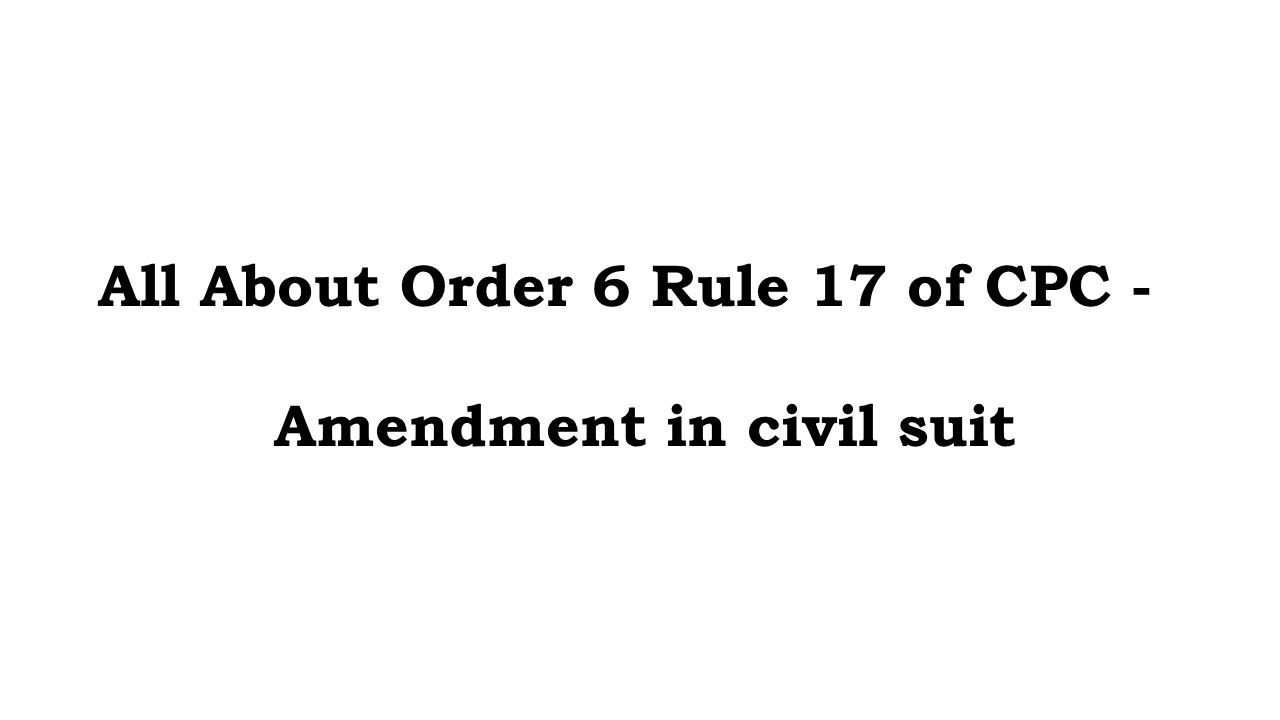
All About Order 6 Rule 17 of CPC - Amendment in civil suit
In a civil suit an amendment means a change which is done in the pleadings that is in the written statements filed by the parties during a civil suit.
All About Order 6 Rule 17 of CPC - Amendment in civil suit
1.Introduction
In order to deliver a fair trial with the application of the principles of natural justice a procedural code was applied all over India known as Civil Procedure Code in 1908 to dispose off a civil suit with expedition to deliver justice. Now a civil suit is defined as a legal action between two parties by application of procedural laws in civil courts for the purpose of seeking relief for the parties.
- Essentials of a Civil Suit
There are 4 essentials of a civil suit-
- Parties- there must be two parties one plaintiff and one defendant or more.
- Cause of action- the ground on which a case has been brought has to be proved by plaintiff to obtain justice
- The subject matter – there must be a subject matter with respect to the civil dispute.
- Relief claimed by a plaintiff- court only grants relief unless it is specifically claimed by the party.
- Meaning of Pleading
- Pleadings are basically the written statement including paragraphs, dates, numbers, sums etc. that is comprising of important concise facts on which a party relies for his claim or defence. The court while making a decision only consider the facts of the pleadings. Order VI, Rule 1 of the First Schedule of the Code, Pleading means plaint or written statement.
- Meaning of Amendment
In a civil suit an amendment means a change which is done in the pleadings that is in the written statements filed by the parties during a civil suit.
- Meaning of Amendment in Civil Suit
An amendment in civil suit or civil proceedings is done in the pleadings Which means making formal changes in the written statement submitted by the parties in a court case in compliance with the rules of the code of civil procedure, the parties to the suit can make changes during the course of trial with the permission of the court. The main purpose of the amendment is to bring about the real facts and resolve the issues in order to serve the justice to the parties. The amendments sought are time barred should be made within the period set by the court.
Order VI Rule 17 deals with the amendments of pleadings in civil suit as under:
The court may at any stage of the proceeding allow either party to alter or amend his pleadings in such a manner and on such terms as may be just, and all such amendments shall be made necessary for the purpose of determining the real question in controversy between the parties.
Provided that no application for amendment shall be allowed after the trial has commenced, unless the court comes to the conclusion that in spite of due diligence, the party could not have raised the matter before the commencement of trial.
Therefore, an amendment involves alteration, modification or deletion of the pleadings in civil proceedings.
- Contents Amended in a Civil Suit
The plaint filed by the plaintiff contains a precise document fencing the claims and alleged allegations against the defendant. The defendant in order to counter the plaintiff can amend his written statements. In this procedural way both the plaint and defendant can amend the contents in their respective suits.
- Different Kinds of Amendment
- Section 152- Amendment of clerical and arithmetical mistakes in judgements, decrees or orders corrected by courts by its own motion or by application of parties.
- Section 153- General power of the court to amend the proceedings in order to determine real question or issue on such proceeding.
- Order 1, Rule 10, sub-r (2)- Striking out or adding the parties
- Order 22 Rules 3&4 – Adding legal representatives of deceased parties.
- Order 6, Rule 16- Amending your opponent’s pleading: compulsory amendment.
- Order 6 Rule 17- Amending your own pleadings: voluntary amendment of pleadings.
https://phenixbaylegal.com/format-for-amendment-petition-under-order-6-rule-17-of-cpc-format/594
- Requisite Conditions for Amendment in Civil Suit
Amendment of pleadings in a civil proceeding require the fulfillment of certain conditions
5.1 Establishment of Good Faith
The amendment must be made in good faith and not to take any undue advantage from the court or from the opposing party.
Case Example- A judgement gave an important finding in T.V. Sasikala vs. C.P Joseph that in a case before allowing an application of amendment the court must ensure that party is praying in a good faith for a fair trial.
5.2 Abiding the Time Limit
Parties should file the amendment within the specific time period imposed by the court.
Case Example- In Ashutosh Chaturvedi vs Prano Devi, AIR 2008 SC 2171, the right to property could not be claimed by the family within one year, the plaint was sought to amended after 13 years, the fact was that sale execution took place in violation of an injunction order and matter remained in lower court over a long period the court held that it was not a good ground for allowing the amendment.
5.3 Termination of Prejudice
Amendments made should not do any unfair biasness towards the opposite party.
Case Example- In Mount Mary Enterprises vs Jivaratna Medi Treat Private Limited (2015 {4} SCC 182, the supreme court held that suit for specific performance of a property was of sum of Rs 13,50,000 and after amendment of suit the value had been Rs 1,20,000 as per the original market value of the property the amendment application was granted as there was no prejudice to the defendants.
5.4 Need for Dispute Resolution
The cause should be a necessary and real one in order to ensure proper resolution of the dispute and delivery of justice.
Case Example – Rajesh kumar Aggarwal and others vs. K.K. Modi and others, in this case the court shall allow amendment to pleadings if they are necessary to brig out the real issues in a particular case as long as it doesn’t harm the other party and cause prejudice. The rule under Order VI Rule 17 makes the courts to allow necessary amendments to determine the true issues in disputes.
- Procedure for Filing an Application for Amendment in Civil
Suit6.1 Step1- Application for Amendment
The party whosoever it may be plaintiff or defendant must file an application stating the reasons for the process of amendment before the relevant judge of the civil court.
Case Example- In Uday Shankar Triyar vs Ram Kalewar Prasad Singh And Another- the court held that procedural defects which are curable shall not be allowed to defeat the substantive rights or cause any kind of injustice. Procedure should never be made a tool to deny justice.
6.2 Step2- Procedural Fee
Payment of fees is the required next step as per the court fees act for the processing of the application.
6.3 Step3- Review of Application
The judge will review the application and if the judge deems fit that the amendment proposed is necessary for determining the issues resulting from the dispute between two parties then permission will be granted for the amendment
6.4 Step 4- Approval of Court and Order
After receiving the courts approval, the applicant must file the newly
amended pleadings within the period of time specified by the court, if no time period is mentioned then within 14 days from date of receival of courts order.
6.5 Step 5- Opposite Party Response
Providing opposite party, the copy of amended pleadings to make them aware of the changes made in the pleadings and to ensure that opposite party have the right to respond to the amendments accordingly.
Case Example- In the case of Life Insurance Corporation of India vs. Sanjeev Builders Pvt.Ltd. and Anr. – A two judge bench held that whenever amendment of pleadings is done it should comply the guidelines of Order VI Rule 17 of Civil Procedure Code, CPC 1908. The Supreme Court laid down the conditions for all of procedure of amendment in a civil suit which are
1.To go ahead with those amendments which would aid in rendering a justifiable decision then prayer sought for amendment should be allowed.
- multiplicity shall be avoided by and allowed only in case where injustice is not done to other side.
- The Amendment does not raise aa time barred claim
- Delay in applying for amendment with a proper cause could be allowed for the amendment.
7. Advantages of Amendments in civil suit
7.1 Advantage of Adding Excluded Property
By amending the pleadings, the properties which were omitted by cause of error can be included in the pleadings.
Case Example -In Manindra Chandra Nandi Bahadur vs Rangaal Mandal And Others, AIR 1918 Calcutta 443.- in a suit filed seeking to amend the schedule to the plaint from original plot of 9 lands to 59 plots of an area the amendment was granted as there were changes in the material facts only and not to pure addition of properties.
7.2 Advantage of Eliminating Multiple Suits
It is the great advantage for termination of multiple suits and conserving time of court.
Case Example- In M Revanna vs Anjanamma the court held that amendment can be claimed as a matter of right but the burden of proof is on person who seeks an amendment also in order to avoid multiplicity of proceedings the court thoroughly checks the intention of filling the application.
7.3 Advantage of Fair Trail
Amendment prevents one party to take advantage over another party by giving both parties an equal opportunity.
Case Example- Ma Shwe Mya vs. Maung Mo Huang [1922 24 BOMLR 682] the Privy Council has observed that rules of the court are intended to secure justice for that to be achieved full powers has to be exercised by the court and an amendment cannot be made to substitute one cause of action for another.
7.4 Advantage by Reducing Time Delay
Speeding up the judicial system resolution of cases by reducing the delays by allowing parties to amend their plead beforehand the commencement of the trial.
Case Example- In South Konkan Distilleries & Anr vs. Prabhakar Gajanan Naik & Ors. It was held that there is no absolute rule that in every case where a relief is barred due to limitation amendment should not be allowed it depends on the court to allow an amendment which serve the ultimate cause of justice.
7.5 Advantage of Dispute Resolution
More accurate and fair dispute resolution saving the time of extra need of additional evidence also so as to promote settlement between the parties.
Case Example- Mohinder Kumar Mehra vs Roop Rani Mehra & Ors. The word used in proviso is before the commencement of the trial, the trial commences when the court examines the pleadings in this case after the issues are framed case is fixed for hearing the party which has the right to produce his evidence and the trial commences.
7.6 Advantage of Correcting Errors
If the statements are written wrong in pleadings amendment can be made to correct those errors.
Case Example- In Mahila Ramkali Dev & Ors vs. Nandram [2015 (15) SCC 132], the Hon’ble supreme court held that a party cannot be refused to relief due to mere mistake or negligence or error unless it is malafide or fraudulent intention for amendment.
- Refusal of Court for the Amendment of Civil Suit
The court in following conditions refuse to grant permission for amendment of pleadings in a civil suit:
8.1 Malice Intention
When the amendment is made with a malafide intention or wrongful intention it is refused by the court.
Case example- In Rameshkumar Agarwal vs Rajmala Exports Pvt. Ltd. (2012)5 SCC 337 - The supreme court held that the courts must not refuse any such amendments that are made in bonafide interest, legitimate manner and which are honest and refuse such amendments which are dishonest, malice and fraudulent.
8.2 legal Rights Violation
If the amendment results in the violation of the legal rights of the party such amendment is refused by the court.
Case Example- In case of Cropper vs Smith [ (1884) 26 ch. D. 700 (CA) – the courts held that the object of the courts is to decide the rights of the parties and not to punish them for mistakes if there is violation of rights such amendment is refused by the court.
8.3 Irrelevant Modification
Unnecessary modification is not entertained by the court and the amendment is refused.
Case Example- In Heeralal vs. Kalyan Mal, the plaintiff filed suit for partition and the defendants filed an amendment application under Order 6 Rule 17 stating 7 properties out of 10 are joint property and only 3 are exclusive properties in order to withdraw the seven properties, the supreme court held that the said amendment if allowed would displace the plaintiffs case and his rights to get the preliminary decree for partition hence the amendment was permissible.
8.4 Failure of Multiple Attempts
If the party fails to amend the pleadings after multiple opportunities without the legit given cause, then court refuse the amendment of pleadings.
Case Example- the hon’ble High Court of Delhi in the case of Inderjeet vs Agricultural Produce Market Committee [2002(95) DLT462] held that pleadings can be allowed at any stage in the proceedings in a suit but if prayed should avoid controversy or multiplicity of proceedings between the parties.
8.5 Negligent Behavior
If the plaintiff or defendant becomes negligent in making the required necessary amendment during the proceedings then also court refuses the amendment of pleadings.
Case Example- N.C. Bansal vs. UPFC ANR.S a petition was filed under Article227 of Indian Constitution the petitioner seeked to impugn the order by filing an application under Order 6 Rule 17 for incorporation of RTI application in the plaint claiming that information is with regard to signing of documents in a forged manner on the loan documents, the court held that there are no reasons to interfere with the impugned order and the petition was dismissed
8.6 Altered Nature and Introduction of New Case
If the amendment alters the nature of the case or any such amendment that wholly changes the case and its core by introducing new set of relevant facts and materials then also the amendment is refused by the court.
Case Example- Usha Balasaheb Swami & Ors. Vs Kiran Appaso Swami &Ors. [2007 (5) SCC 602]., the honorable supreme court held that the amendments can’t be allowed if it changes the nature of the case and also alter the cause of action.
- Amendment in Civil Suit and Limitation
When a suit is barred by the law of limitation then it is also subjected to considerations by the courts. for example, in the case of
The supreme court in Raj Kumar VS Dipender Kaur Sethi held that the amendment of the second plaint in suit was allowed by the trail court as rectification of the draftsman of the court was sought to be rectified. Such allowance is done in keeping in mind to fulfil the purpose of justice and not be merely disallowed as it was barred by limitation.
- Amendment in suit after the commencement of trial
10.1 Case example when amendment was not allowed
The government leased out a landed property to private company for mining purposes despite having this knowledge the plaintiff claimed his exclusive right for the ongoing operations and prayed for amendment in the argument stage, the supreme court did not allow the amendment pleaded by the plaintiff.
10.2 Case example when the amendment was allowed
The paint filed by the plaintiff was lacking the accordance of provisions of Order 7, Rule 3 also the survey numbers and boundaries of the property were not mentioned, the amendment was made to add the description of property, the court held that no arousal of new cause of action and any kind of prejudice to anybody hence the amendment was allowed by the court.
- Effect of Amendment
Where an amendment is allowed, it shall be treated to be included in the plaint from the date when the plaint was originally instituted. The court should treat the pleading in the same manner as it has been presented after the amendment.
In the case of Sampat Kumar Vs Ayyakannu court held that no amendment in pleading can be claimed as a matter of right. Amendments are allowed in pleadings to avoid the multiplicity of litigation.
- Application of Amendment in Different Proceedings
Order VI Rule 17 is applicable not only to suits, it is also applicable to insolvency proceedings, arbitration proceedings, rent control act, matrimonial disputes etc.
- Doctrine of Relation Back
The doctrine of relation back is impliedly given under Order VI Rule 17 of the code. It provides that a court can allow a party to a suit to amend the pleadings at any time before the trial, if it is necessary to determine the issues between the parties.
- Case Laws Regarding Amendment of Civil Suit
- Heeralal vs Kalyanlal (1998) SCC 278
- Surendra Kumar Sharma vs Makhan Singh-(2009) 10 SCC 626-
- Narne Esates Pvt.Ltd. Rep by its Chairman vs N. Gopal Reddy-(2011) 5ALD 445
- Pankaja VS Yellappa- AIR 2004 SC 4102
- Modi Spg. & Weaving Mills CO. Ltd. vs Ladha Ram & Co. – (1976) 4 SCC 320
- Gautam Sarup vs. Leela Jetly – (2008) 7 SCC 85
- Surendra Kumar Sharma vs. Makhan Singh – (2009) 10 SCC 626
- Raj Kumar Gurawara vs M/s. S.K. Sarwagi and co. Pvt.Ltd. vs – AIR 2008 SC 2303
- Rajesh Kumar Aggarwal vs K.K. Modi- AIR 2006 SC 1647
- Ajendraprasadji N. Pande vs. Swami Keshavprakeshdaji N- AIR 2007 SC 806
- Recent Judgement of Hon Supreme Court on Order VI Rule 17
IN BASAVARAJ VS INDIRA AND OTHERS CIVIL APPEAL NO. 2886 OF 2012 on 29 February 2024
Subject of case- the case is based on Order VI Rule 17 of CPC
Facts of the case: -
Basavaraj was the appellant and Indira and Others were the Respondent in this case.Respondent 1 &2 filed a suit for partition of the ancestral property of their grandfather as no actual partition of the property never happened. They filled an application to amend the plaint during the end of the suit.This amendment petition prayed for declaration that an earlier compromise decree dated 14/10/2004 to be null and void.Ground of prayer of amendment was due to oversight and mistake on part of respondent and were not relieved by the declaration.The Trial Court dismissed the application. The Respondent then challenged the order of Trial Court before the Hon’ble High Court, the Hight Court set aside the order of the Trial Court and the amendment sought was allowed prayed by the Respondents.Now the Appellant challenged the order of High Court before the Hon’ble Supreme Court.
Grounds for the challenge from Appellant in supreme court was
-
- Despite a Compromise Decree of Lok Adalat of 14/10/2004 was in force, Respondents 1&2 filed a fresh suit in 2005 seeking partition with reference to decree of the Lok Adalat without challenging the decree.
- As a result of the order passed by the High Court the nature of the suit was changed from partition to declaration which is not feasible. Here nature of suit was changing as mentioned in proviso of Order 6 Rule 17 of CPC.
- Also provisions XVIII Rule 3 CPC a compromise decree has to challenged in the same court that is Lok Adalat and not any other court.
- Also, the petition prayed for the declaration of decree to be null and void on 8/02/2010 that is 5 years and 3 months after passing of the declaration decree. The limitation period is of only 3 years so it becomes time barred.
Laws laid down – Order VI Rule 17 of CPC
Judgement – On basis of above facts the Hon’ble Supreme Court on 29 February
Allowed the appeal and set aside the order of the High Court, simultaneously the Appellant shall be entitled payment of Rs 100000 by Respondents 1&2.
Result – Appeal was allowed.
My views on Amendment in Civil Suit
The burden on civil courts is at large also to avoid creating multiplicity of cases amendment in civil suit is an aid in law which we get under Order VI Rule 17, also it reduces the ambiguity produced in the plaint and gives a fair chance for its correction. Its an eye opener tool which also detects the nature of the deviation of the case. Order VI Rule 17 governs the smooth functioning of the procedural laws.
Conclusion
Thus, Amendments in civil suit refers as modification in the written statements before the proceeding commences and in middle of proceeding amendment is allowed only under the discretion of the judge or if the nature of the case is not altered. For a better resolution of case and ensuring justice to the parties is the main goal of amendment it also increases the efficiency and rectitude attributes of the legal proceedings also reflects the nobility of the profession of law.
References
Code of Civil Procedure Bare Act
Dr. Avatar Singh Book, THE CODE OF CIVIL PROCEDURE
cases from live law.com
Amendmen of pleadings rgaa.com
dhyeyalaw.com understanding the summary of SC judgment
i pleaders.com
law Bhoomi.com
paper presentation on amendment of pleadings kortula.pdfPaper Presentation
https://www.rgaa.co.in/amendment-of-pleadings-in-civil-suits/
For the Format of Order 6 Rule 17 Click Here
Author is an Advocate Devshree Majumdar Practicing in Chhattisgarh High Court
#court #order6rule17cpc #cpc #amendmentpetition #formatof amendmentpetitioncpc #formatoforder6rule17petition #caselawsonamendmentpetition #supremecourtcaselaws #ballbstudent #researchlaws #india #english #hindi #formats #formatscourtpetitions
Tags
General Legal Hashtags
- #PhenixBayLegal
- #LegalAdviceIndia
- #IndianLawUpdates
- #LegalServicesIndia
- #LegalBlogsIndia
Regional Hashtags (Geographical Coverage)
- #NorthIndiaLegalUpdates
- #SouthIndiaLegalAdvice
- #EastIndiaLawServices
- #WestIndiaLegalResources
- #NortheastIndiaLaw
City-Specific Hashtags
- #DelhiLegalServices
- #MumbaiLawUpdates
- #BangaloreLawAdvice
- #ChennaiLegalHelp
- #KolkataLegalConsultation
- #HyderabadLawyers
- #PuneLegalTips
- #AhmedabadLegalServices
- #LucknowLawConsultation
- #ChandigarhLegalAdvice
Broader Indian Legal System Hashtags
- #IndianLegalSystem
- #IndianCourtUpdates
- #LegalAwarenessIndia
- #LawInIndia
- #LegalRightsIndia
- #LawFirmIndia
- #LegalSupportIndia
- #LegalUpdatesIndia
- #LegalAwarenessCampaign
More >>

Jyoti Sharma vs. Vishnu Goyal & Anr. 2025 INSC 1099
This was a long running legal battle between a landlord and her tenants over a shop. The landlord, Jyoti Sharma, wanted her shop back for two main reasons: The tenants had stopped paying rent. She needed the shop to expand her family's business (her bonafide need).
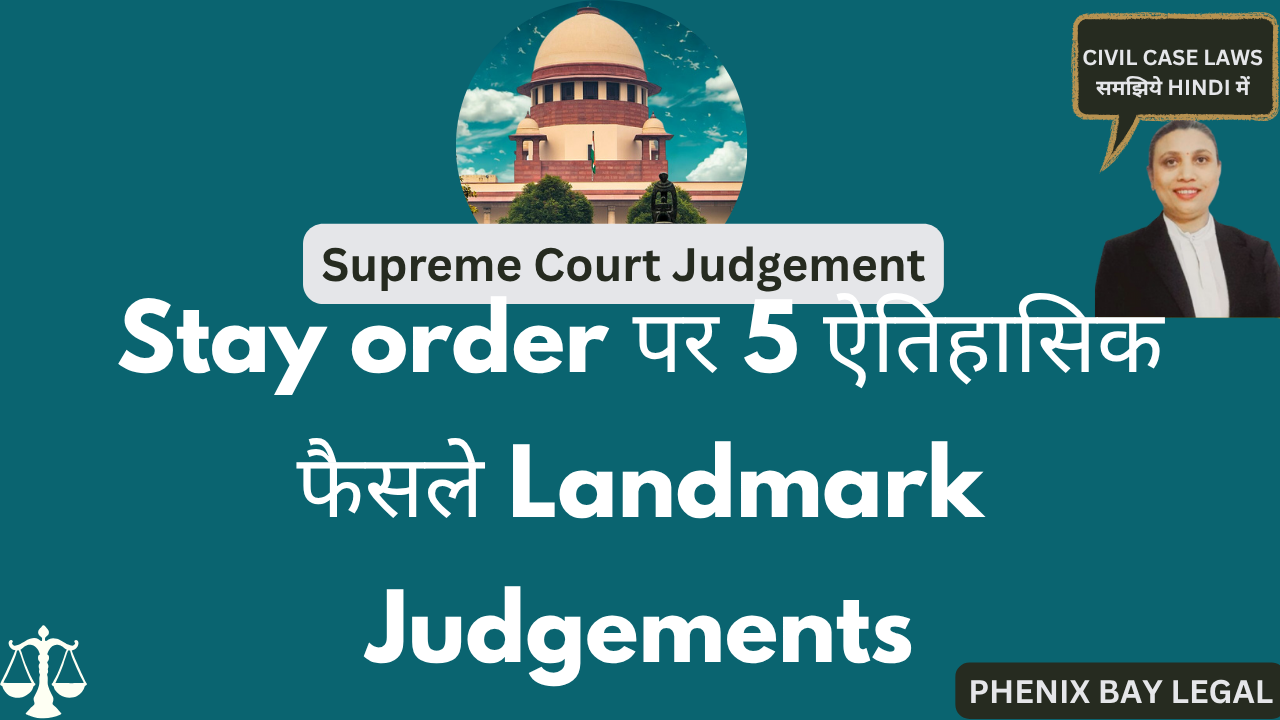
Landmark Judgement on Injunction
In civil, commercial, or even family disputes. But when is a simple injunction suit enough? When do you need to add a declaration of title? And how do courts balance urgency vs evidence in interim relief?
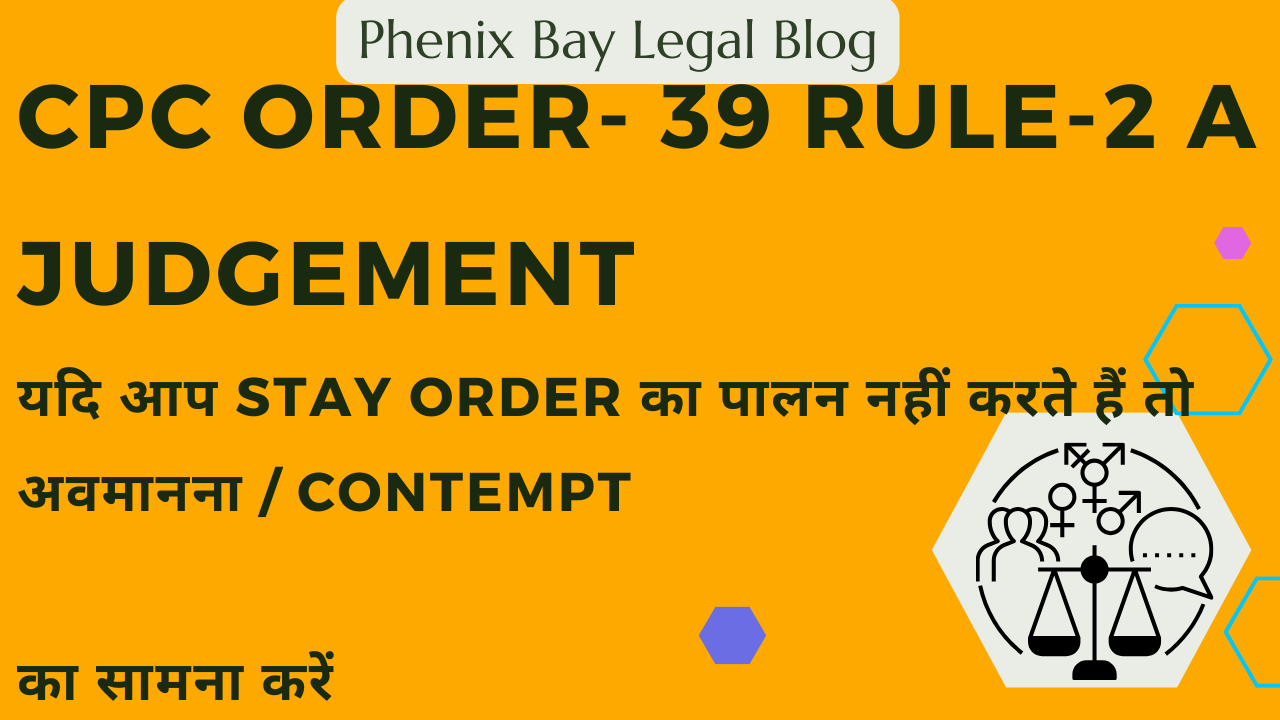
Case Analysis: Stay Order Violation and Contempt of Court by Supreme Court of India
Giving an undertaking to the court is equivalent to an order of injunction—any violation invites contempt proceedings.Injunction orders remain valid until formally vacated by a court—violation before vacation can lead to punishment.
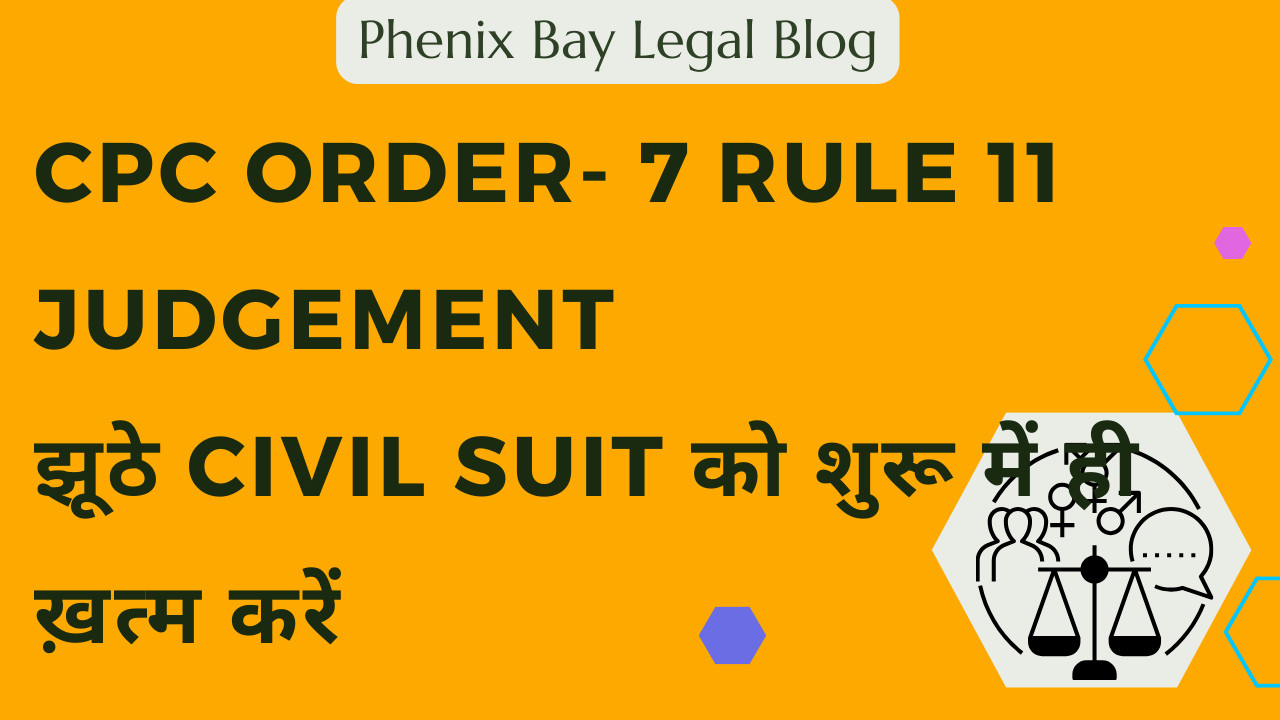
Order 7 Rule 11 of CPC Explanation in Land Mark Judgement
The Sopan Sukhdeo Sable judgment is a landmark ruling that reinforces Order 7 Rule 11 of CPC as a safeguard against frivolous and legally untenable claims. It highlights the importance of examining only the plaint’s contents to decide whether a suit should be dismissed at the threshold.
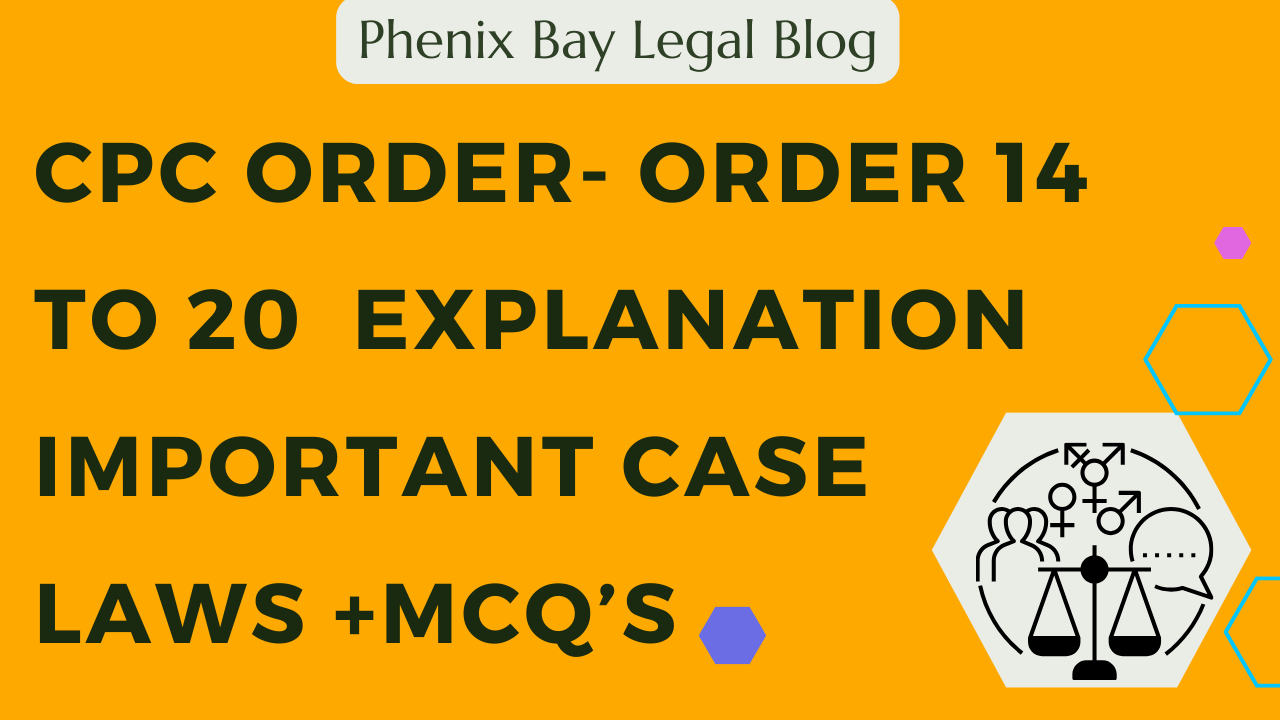
CPC Order- Order 14 to 20 Explanation IMPORTANT CASE LAWS +MCQ’S for Judiciary Exam Preparation
CPC Order- Order 14 to 20 Explanation IMPORTANT CASE LAWS +MCQ’S for Judiciary Exam Preparation
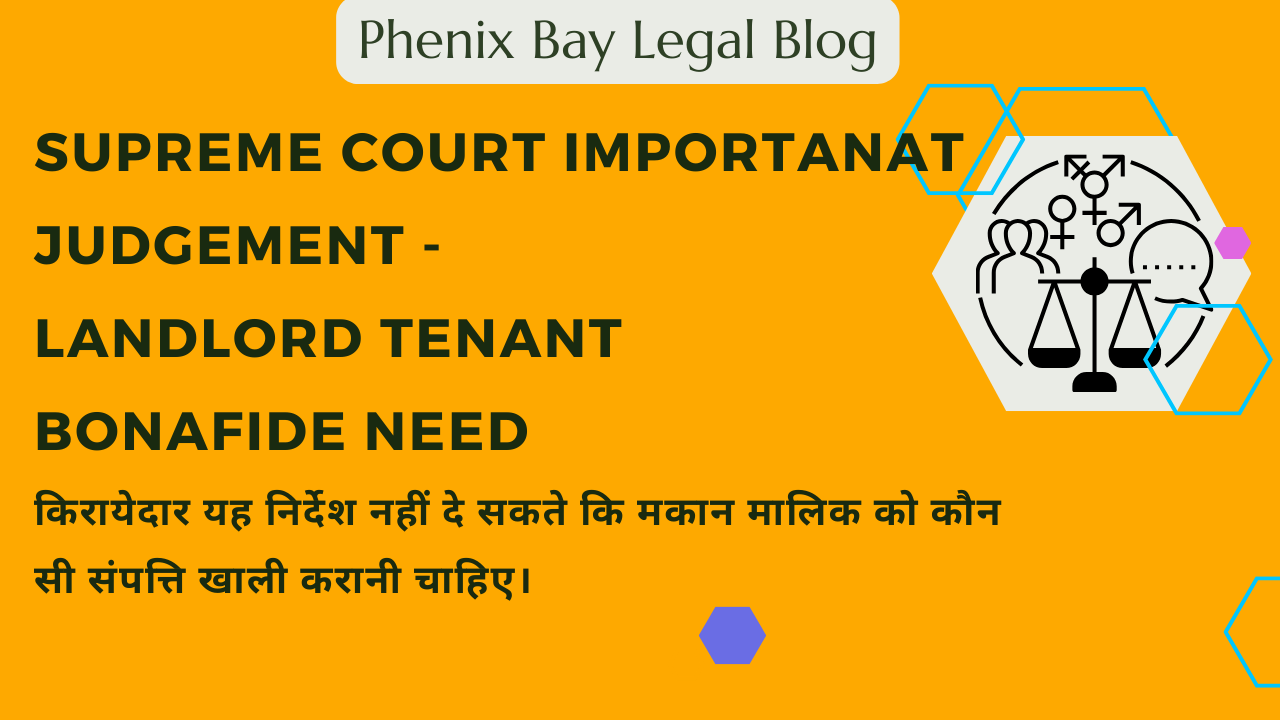
Supreme Court ImportanatJudgement - Landlord Tenant Bonafide need
This case involves a dispute over eviction of a tenant based on the bona fide need of the landlord. The Supreme Court ruled in favor of the landlord, reversing the High Court's decision. Below is a detailed breakdown of the judgment with relevant legal principles, precedents, and reasoning.